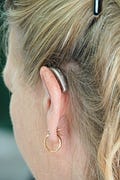Bureaucratic Overreach and Unintended Consequences
If a tree falls in the forest, the FDA might be making it harder for many to hear it
In 2017, as part of the FDA Reauthorization Act of 2017, the FDA was instructed to create and implement regulations to provide rules for the availability and sale of over-the-counter hearing aids. Due to the pandemic, that rule did not get issued until earlier this year.
In and of itself, this is a good thing. The rule specifically states that OTC hearing aids are not for children nor are they for people with more than a mild-to-moderate hearing loss as both groups will need more specialized care and the expertise of trained medical professionals - namely audiologists1. All in all, I think that is a fair balance between the interests of greater competition and medical considerations.
However, the FDA was not content to limit itself to this.
In addition to creating the regulatory category for OTC hearing aids, the FDA also changed the definition for all other hearing aids. Prior to the new regulation hearing aids were classified as a restricted medical device and there was a specific federal preemption of state law allowing audiologists to dispense hearing aids; you need to see a medical professional to get them but it isn’t actually a prescription. Per the new regulation, all non-OTC hearing aids are now classified instead as prescription medical devices.
This is a huge deal. Even though the FDA has insisted that the new rule:
• Does not change the necessary qualifications of who may provide hearing healthcare with prescription hearing aids, including the recommendation, selection, fitting, and dispensing of these devices;
• Does not require an additional professional to take actions, for example, does not in any way require a physician’s involvement prior to fitting these devices; and
• Does not require an examination of any kind to obtain a prescription hearing aid.
the simple fact of the matter is they are wrong.
As has been noted by Dr. Jeffrey Singer of the Cato Institute in making this change the FDA eliminated the preemption protecting the right of audiologists to provide hearing aids to their patients.
In Maryland, and I have been told, each of the other 50 states, audiologists do not have prescribing authority. As such, state scope-of-practice laws bar them from being able to provide hearing aids to their patients on their own. Any patient desiring the aid of an audiologist to treat their hearing loss will need to do one of the following:
Find an audiologist who will confirm they need hearing aids and that their loss is such they will not be adequately served by OTC aids. Then they will have to find and make an appointment with an ENT or other doctor with prescribing authority. That doctor will need to write a prescription and then once they have aids they will need to return to the audiologist to have the aids programmed for their specific hearing loss.
Try and make do with OTC aids that the government has said are only intended for adults with mild-to-moderate hearing loss.
Simply go without hearing aids.
Find an audiologist willing to take their chances on the non-binding FDA guidance being sufficient and willing to provide hearing aids at risk of punishment from the state for providing the care they spent years learning exactly how to do.
This is an absurd, but hardly unsurprising outcome. Government, at all levels, has a rich and lengthy track record for implementing well-intentioned policies that lead to unintended outcomes ranging from the inane to the outrageous to the flat-out evil.
But especially infuriating is that the FDA was explicitly warned and cautioned against doing this. In comment submitted on the proposed rule, the Academy of Doctors of Audiology and others expressly questioned the rationale for changing non-OTC hearing aids from restricted status to prescription status and called for express protections to be implemented to prevent state law from getting us into the very situation we are in now. However, the FDA apparently felt it knew better.
Obviously there are answers here, but given the potential severity of the situation, none of them are particularly good given the time it will take to implement them. The FDA could revise the rule, giving its guidance force of law. Congress could step in, passing a law to either undo the change from restricted to prescription or to put in place some federal preemption of scope-of-practice laws for prescription hearing aids. Or every state could go about amending its state scope-of-practice laws (likely over the objection of ENTs who might see it as a threat if audiologists have even a limited prescribing authority).
I for one hope to see all three pursued as well as any other solutions I have not thought of. But in the meantime, we can let this be a lesson about the risks that can accompany even the best of ideas and the dangers of government bureaucracies going well beyond the mandates they were given.
Full disclosure, I am married to a Maryland audiologist.





The better question is WHY are hearing aids, which are not taxable as they are medical equipment, not covered by most health insurance companies? Unlike eyeglasses which need to be replaced every two years on average, hearing aids have internal controls that can be tweaked as the wearer's needs change. My last set lasted 11 years. The new set cost me $4,000. I have a severe to profound hearing loss. Those OTC aids are useless for me. This lack of health insurance coverage is blatant discrimination.